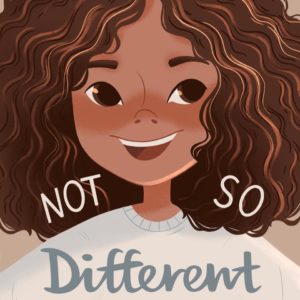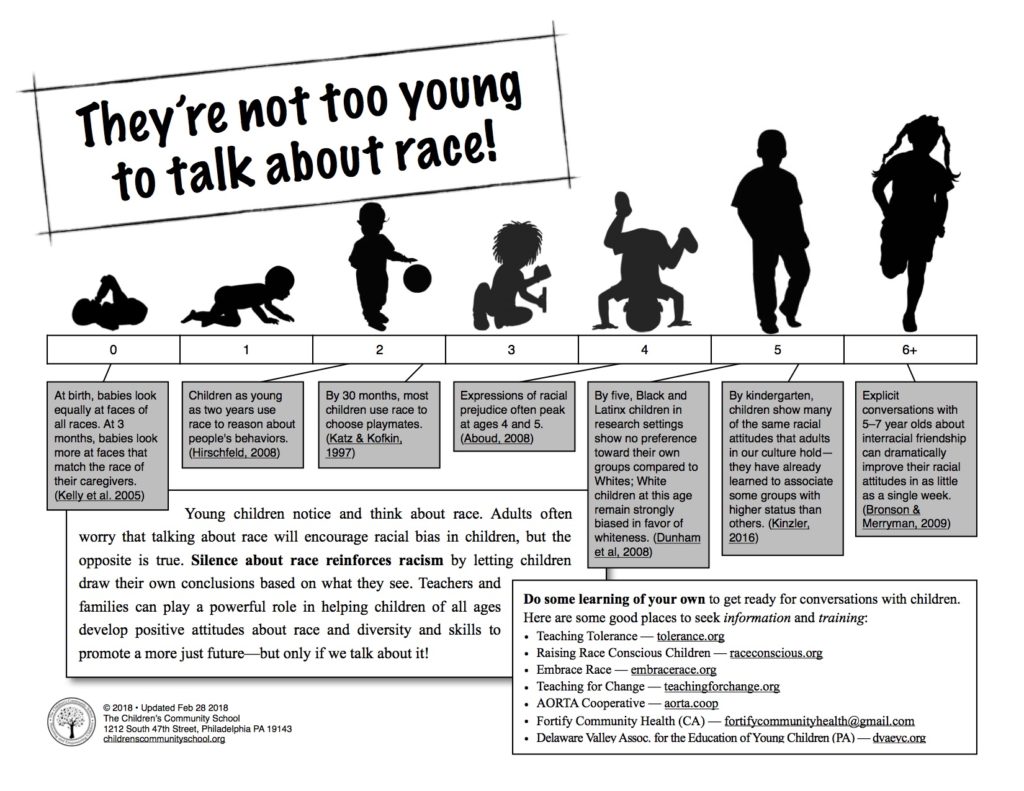
Racism. It has been all over the news and social media and we understand it can be intimidating for parents to talk about it with their children, specifically, white parents of white children.
In fact, we’ve received questions from our friends who want to learn more about racism so they can teach their kids and help solve this human rights issue.
So in this article, we are going to share 3 simple things white parents can do to help. Plus useful resources like books, podcasts, movies, documentaries, and more.
Let’s get started.
As an interracial and multicultural couple, we’ve had to talk to our own children who are biracial, 5 and 7, (as of writing this in 2020). It’s a heartbreaking conversation to have.
Because our children are brown we have to explain that the world is going to perceive them as black, and they will be ‘disliked’ and judged based on the way they look.
As we looked into their beautiful, sweet faces and broke a piece of their innocence for their safety — their survival as brown women, we asked ourselves:
“Why are parents of children of color the only ones having to have these conversations?”
Why are parents of children of color the only ones having to have conversations about racism?Click To TweetMost well-meaning parents of white children prefer to take a ‘colorblind’ approach to race. “Just treat everybody the same and not see color, or point out differences.” But that in itself is a choice of privilege and harmful to our brothers and sisters of color.
We should be celebrating our differences.
Wouldn’t it be boring if all crayons came in one color? Trever Noah explained it beautifully when in an interview he said, “You wouldn’t prove you’re not sexist by saying you don’t see gender.”
Race is a social construct.
We are all human beings. But, we live in a society with racial lines drawn in the sand. So what can we do to promote inclusivity and diversity?
How can we help end this white supremacy and racism that is plaguing our nation?
What can you do as parents to raise children who will be able to recognize racism and use their white privilege to stand up for their oppressed peers?
Here’s what we recommend.
3 Things we recommend for parents teaching kids about racism
1. Educate yourself about racism.
It starts with you. Because one way to lessen the overwhelming fear or discomfort with the topic of racism is to learn about it yourself.
This is a journey, and it will be hard because you will have to acknowledge your own bias and prejudice. Plus the racism that comes from being raised in a society with racism ingrained in the DNA of the system the country was built on.
It’s not for the faint of heart. But is vital to ending racism because you can’t teach what you don’t know.
So:
Learn what racism is, how it works in society especially in a structural manner, and what everyone can do to eradicate it.
2. Teach your kids to embrace people of different races.
Teach them about different ethnicities.
Expose them to diversity in the books they read, shows they watch, toys, and games they play with.
3. Expose yourself and your kids to people of different races.
Purposely go out and make friends of different races for yourself and your children. Diversify your social circles.
We’re all just people. No matter the race, we are all human and have much more in common than we have differences.
This will help you and your kids to have real-life experiences practicing what you have learned about racism. Go out of your comfort zone, or deepen acquaintances with people of color into actual friendships.
Note:
Don’t go to these friends of color and ask them what you can do about this disease of racism because most of them are tired. This very article is created to help answer your questions. Plus you have the internet and many online groups to get resources.
Resources for teaching kids about racism
Below are useful resources to check out, just choose a section to start with.
Movies, Documentaries, Interviews
Adult Books to Read
1. [easyazon_link identifier=”B07638ZFN1″ locale=”US” tag=”ourpeafam-20″]White Fragility: Why It’s So Hard for White People to Talk About Racism[/easyazon_link]
[easyazon_image align=”center” height=”500″ identifier=”B07638ZFN1″ locale=”US” src=”https://m.media-amazon.com/images/I/51aDh-YMFAL.jpg” tag=”ourpeafam-20″ width=”333″]
This book dives deeper into the phenomenon known as white fragility. The author helps us to understand racism is not necessarily only perpetuated and acted out by ‘bad people’.
White fragility refers to the defensive posture that white people make when challenged racially. White fragility can manifest with emotions such as guilt or anger, and spill out into behaviors like arguing or silence.
In this book, you’ll learn how white fragility is developed, how it protects racial inequality, and what you can do to engage more intentionally.
2. [easyazon_link identifier=”0525509283″ locale=”US” tag=”ourpeafam-20″]How to Be an Anti-Racist[/easyazon_link]
[easyazon_image align=”center” height=”500″ identifier=”0525509283″ locale=”US” src=”https://m.media-amazon.com/images/I/51JM3rldZCL.jpg” tag=”ourpeafam-20″ width=”331″]
In this book, you’ll take a closer look at racist ideas, be able to recognize them more clearly, see their consequences and be able to help oppose them by taking an active role in the fight against racism.
3. [easyazon_link identifier=”1580058825″ locale=”US” tag=”ourpeafam-20″]So You Want to Talk About Race[/easyazon_link]
[easyazon_image align=”center” height=”500″ identifier=”1580058825″ locale=”US” src=”https://m.media-amazon.com/images/I/41XIlsrvpIL.jpg” tag=”ourpeafam-20″ width=”333″]
This book takes a closer look at how to have conversations about race with friends and family and the society we live in every day.
Plus a deeper dive at subjects to help you better understand them in order to respond in an educated manner to help stop perpetuating racism.
4. [easyazon_link identifier=”1250135990″ locale=”US” tag=”ourpeafam-20″]Tears We Cannot Stop[/easyazon_link]
[easyazon_image align=”center” height=”500″ identifier=”1250135990″ locale=”US” src=”https://m.media-amazon.com/images/I/41eDb2HctsL.jpg” tag=”ourpeafam-20″ width=”339″]
A short, poignant, and important message for today’s racial climate.
Dyson makes the argument that if we as a country are ever going to make real progress when it comes to our racial divides, we have to face some difficult truths.
These truths include being honest about how black suffering has long been ignored, dismissed, or discounted.
5. [easyazon_link identifier=”1568585985″ locale=”US” tag=”ourpeafam-20″]Stamped from the Beginning: The Definitive History of Racist Ideas in America[/easyazon_link]
[easyazon_image align=”center” height=”500″ identifier=”1568585985″ locale=”US” src=”https://m.media-amazon.com/images/I/51X2Qat32TL.jpg” tag=”ourpeafam-20″ width=”333″]
This amazing book by Dr. Ibram X. Kendi, a National Book Award-winning author, shows the history of racism ideals in America while inspiring hope for a future without racism.
It takes you on a journey through time, explains why the black community feels the way they do, why the disease of racism still continues, and how you can discredit the racist views that are perpetuated in society.
6. [easyazon_link identifier=”0985217278″ locale=”US” tag=”ourpeafam-20″]Post Traumatic Slave Syndrome: America’s Legacy of Enduring Injury and Healing[/easyazon_link]
[easyazon_image align=”center” height=”500″ identifier=”0985217278″ locale=”US” src=”https://m.media-amazon.com/images/I/51Wz4qLDzGL.jpg” tag=”ourpeafam-20″ width=”333″]
This eye-opening book gives you a raw look at the true dark history of America from slavery to the thirteenth amendment and more.
It takes a real hard look at the effects such trauma has on the people affected by these grievous acts and how it is still being perpetuated today.
7. [easyazon_link identifier=”1501878077″ locale=”US” tag=”ourpeafam-20″]Raising White Kids[/easyazon_link]
[easyazon_image align=”center” height=”500″ identifier=”1501878077″ locale=”US” src=”https://m.media-amazon.com/images/I/41t6S7UJVpL.jpg” tag=”ourpeafam-20″ width=”324″]
Want to talk to your kids about race and not sure where to start?
This book offers insight into how to have age-appropriate conversations with your white children about understanding racism.
Plus how to recognize racism and use their white privilege to stand up and be an ally while becoming conscious of the roles they play in society with their own racial identity.
8. [easyazon_link identifier=”0807005932″ locale=”US” tag=”ourpeafam-20″]An African American And LatinX History of the United States[/easyazon_link]
[easyazon_image align=”center” height=”500″ identifier=”0807005932″ locale=”US” src=”https://m.media-amazon.com/images/I/61pB4f9z2VL.jpg” tag=”ourpeafam-20″ width=”328″]
To understand the racial inequalities in America today, you have to go back and learn the true history of this country and not the white-washed version most of the education system teaches. This book is a great start.
9. [easyazon_link identifier=”1620975459″ locale=”US” tag=”ourpeafam-20″]The New Jim Crow: Mass Incarceration in the Age of Colorblindness[/easyazon_link]
[easyazon_image align=”center” height=”500″ identifier=”1620975459″ locale=”US” src=”https://m.media-amazon.com/images/I/410UbG56maL.jpg” tag=”ourpeafam-20″ width=”322″]
This book takes you through the historical events that happened after Jim Crow didn’t really end, but changed forms.
It covers the events that led to mass incarcerations and prison labor (the new slavery) that is still happening today.
10. [easyazon_link identifier=”B071KSKT3K” locale=”US” tag=”ourpeafam-20″]Why Are All the Black Kids Sitting Together in the Cafeteria?: And Other Conversations About Race[/easyazon_link]
[easyazon_image align=”center” height=”500″ identifier=”B071KSKT3K” locale=”US” src=”https://m.media-amazon.com/images/I/51-QWxoaVYL.jpg” tag=”ourpeafam-20″ width=”333″]
This author is renowned for her work with the psychology of race.
Dive deeper to understand why it is so important to have discussions of racial identities in order to help us build bridges across racial divides.
11. [easyazon_link identifier=”0991331303″ locale=”US” tag=”ourpeafam-20″]Waking Up White[/easyazon_link]
[easyazon_image align=”center” height=”500″ identifier=”0991331303″ locale=”US” src=”https://m.media-amazon.com/images/I/41Zp4yhagVL.jpg” tag=”ourpeafam-20″ width=”333″]
If you’re looking to understand your white privilege, this is the book for you.
This is written by a white woman who opens up and tells her journey recognizing her white privilege and coming to terms with the fact that the world we live in rewards her for her skin color and punishes others for theirs.
12. [easyazon_link identifier=”1250306906″ locale=”US” tag=”ourpeafam-20″]When They Call You a Terrorist: A Black Lives Matter Memoir[/easyazon_link]
[easyazon_image align=”center” height=”500″ identifier=”1250306906″ locale=”US” src=”https://m.media-amazon.com/images/I/51uudFdSaCL.jpg” tag=”ourpeafam-20″ width=”333″]
If you really want to understand the Black Lives Matter movement and the people that risk their lives fighting for its goals, then this is the book for you.
This powerful memoir will show you what it is to be black in America today with all the racially-charged tension.
13. [easyazon_link identifier=”0399588191″ locale=”US” tag=”ourpeafam-20″]Born a Crime[/easyazon_link]
[easyazon_image align=”center” height=”500″ identifier=”0399588191″ locale=”US” src=”https://m.media-amazon.com/images/I/5102ogTDCGL.jpg” tag=”ourpeafam-20″ width=”333″]
in this book, Trevor Noah shares his story about being raised in a country that was separated by apartheid society which meant his own existence was a crime.
Books to read to/with your kids
1. [easyazon_link identifier=”B088GYYHJX” locale=”US” tag=”ourpeafam-20″]A Kids Book About Racism[/easyazon_link]
[easyazon_image align=”center” height=”500″ identifier=”B088GYYHJX” locale=”US” src=”https://m.media-amazon.com/images/I/41OeVXxIaZL.jpg” tag=”ourpeafam-20″ width=”400″]
This book shows a clear description of what racism is, how to spot it when it happens, and how it makes people feel when they experience it.
It’s designed to be an introduction to the topic of racism for kids.
2. [easyazon_link identifier=”0679832270″ locale=”US” tag=”ourpeafam-20″]We’re Different, We’re the Same[/easyazon_link]
[easyazon_image align=”center” height=”500″ identifier=”0679832270″ locale=”US” src=”https://m.media-amazon.com/images/I/61-8IllhPlL.jpg” tag=”ourpeafam-20″ width=”500″]
This Sesame Street book shows us that even though we may look different on the outside, we have so much in common.
It teaches that we’re all the same inside, while celebrating our differences on the outside, because that is what makes us all so special.
3. [easyazon_link identifier=”0525579648″ locale=”US” tag=”ourpeafam-20″]All Are Welcome[/easyazon_link]
[easyazon_image align=”center” height=”500″ identifier=”0525579648″ locale=”US” src=”https://m.media-amazon.com/images/I/51D-zrXLO+L.jpg” tag=”ourpeafam-20″ width=”500″]
This book follows a group of kids at their school where kids of all races and cultures are embraced with open arms.
The community comes together to celebrate the Lunar New Year. This story lets kids know that no matter what, they have a space to be welcomed and celebrated.
4. [easyazon_link identifier=”0439472261″ locale=”US” tag=”ourpeafam-20″]The Story Of Ruby Bridges[/easyazon_link]
[easyazon_image align=”center” height=”500″ identifier=”0439472261″ locale=”US” src=”https://m.media-amazon.com/images/I/51D63oi9LTL.jpg” tag=”ourpeafam-20″ width=”399″]
This is one we’ve read to our girls. It takes you through the story of Ruby bridges being selected to be the first and only black child in her school.
This story explains the difficulties in an age-appropriate way, that she faced every day for more than a year as the desegregation of schools began.

“Not So Different” is a picture book that encourages children to embrace their differences and celebrate diversity.
It’s a fun rhythmic read for children, while also serving as a tool for parents to start those difficult conversations.
To pre-order on Amazon, [easyazon_link identifier=”0578690993″ locale=”US” tag=”ourpeafam-20″]click here[/easyazon_link]
6. [easyazon_link identifier=”0545865034″ locale=”US” tag=”ourpeafam-20″]Say Something[/easyazon_link]
[easyazon_image align=”center” height=”461″ identifier=”0545865034″ locale=”US” src=”https://m.media-amazon.com/images/I/51LavROEyhL.jpg” tag=”ourpeafam-20″ width=”500″]
This is an empowering picture book focusing on the power of each of our words and our voice.
Perfect addition for kid activists.
7. [easyazon_link identifier=”1481463349″ locale=”US” tag=”ourpeafam-20″]All American Boys[/easyazon_link]
[easyazon_image align=”center” height=”500″ identifier=”1481463349″ locale=”US” src=”https://m.media-amazon.com/images/I/41pzP-cXDYL.jpg” tag=”ourpeafam-20″ width=”324″]
This book is for teens and young adults.
It takes you through the perspectives of two teens, one black and one white, and their experience with one violent act by a police officer that sets off a trail of dominos thrusting their community into racial tension.
8. [easyazon_link identifier=”B07WTRHW53″ locale=”US” tag=”ourpeafam-20″]Something Happened in Our Town: A Child’s Story About Racial Injustice[/easyazon_link]
[easyazon_image align=”center” height=”500″ identifier=”B07WTRHW53″ locale=”US” src=”https://m.media-amazon.com/images/I/617bfp53PRL.jpg” tag=”ourpeafam-20″ width=”500″]
This story follows two families, one white and one black as the kids ask questions about a police shooting in their town.
It’s a great resource for explaining the hard truths about such traumas, to help them identify and counter racial injustice in their own lives.
9. [easyazon_link identifier=”0385376065″ locale=”US” tag=”ourpeafam-20″]Child of the Civil Rights Movement[/easyazon_link]
[easyazon_image align=”center” height=”500″ identifier=”0385376065″ locale=”US” src=”https://m.media-amazon.com/images/I/613DeX3wa5L.jpg” tag=”ourpeafam-20″ width=”396″]
I (Ash) got choked up when I read this book to my kids. It is read through the eyes of a young girl who witnessed and got to take part in the Selma march.
It mentions uncle “Martin” and several other activist leaders at that time.
This book explains segregation, and what life was like in the deep south at that time. It is a great resource for touching on the facts of that historical time in an age-appropriate way.
To find more diverse books, visit these websites:
Podcasts to Listen
1. Robin DiAngelo on White Fragility – Good Ancestor Podcast
2. Talking Race With Young Children – NPR
3. The Power of Bias and How to Disrupt It in Our Children – Respectful Parenting: Janet Lansbury Unruffled Podcast
4. Brené with Ibram X. Kendi on How to Be an Antiracist – Unlocking Us Podcast
5. The Consequences of Racism – TED Radio Hour Podcast March 16, 2018
6. 1619 Podcast – A podcast from the New York Times
7. The Mind of the Village: Understanding Our Implicit Biases – The Hidden Brain Podcast
8. Confronting Racism – TED Radio Hour Podcast March 29, 2019
9. ‘Raising White Kids’ Author On How White Parents Can Talk About Race – NPR
Movies, documentaries, and interviews to watch
1. How to Talk to Kids About Race
2. 13th Documentary – Also available on Netflix
3. I Am Not Your Negro – Amazon
[easyazon_image align=”center” height=”500″ identifier=”B01MR52U7T” locale=”US” src=”https://m.media-amazon.com/images/I/51qnjwJhf8L.jpg” tag=”ourpeafam-20″ width=”375″]
4. [easyazon_link identifier=”B07M7G24NP” locale=”US” tag=”ourpeafam-20″]Black, White, and Us[/easyazon_link] – Amazon
[easyazon_image align=”center” height=”500″ identifier=”B07M7G24NP” locale=”US” src=”https://m.media-amazon.com/images/I/41N7kj7Bi8L.jpg” tag=”ourpeafam-20″ width=”375″]
5. Uncomfortable Conversations with a Black Man
6. Something Happened in Our Town
7. [easyazon_link identifier=”B082YKN1M1″ locale=”US” tag=”ourpeafam-20″]Just Mercy Movie[/easyazon_link] – Amazon
[easyazon_image align=”center” height=”500″ identifier=”B082YKN1M1″ locale=”US” src=”https://m.media-amazon.com/images/I/41b3AXnuA8L.jpg” tag=”ourpeafam-20″ width=”375″]
8. How Structural Racism Works – Brown University
9. [easyazon_link identifier=”B00S0X4HK8″ locale=”US” tag=”ourpeafam-20″]Selma[/easyazon_link] – Amazon
[easyazon_image align=”center” height=”500″ identifier=”B00S0X4HK8″ locale=”US” src=”https://m.media-amazon.com/images/I/51bVmSE-u0L.jpg” tag=”ourpeafam-20″ width=”333″]
10. When They See Us – Netflix
11. A Conversation on Race – New York Times
12. [easyazon_link identifier=”B000QFQE4U” locale=”US” tag=”ourpeafam-20″]Malcolm X Movie [/easyazon_link] – Amazon
[easyazon_image align=”center” height=”500″ identifier=”B000QFQE4U” locale=”US” src=”https://m.media-amazon.com/images/I/51B3JGnXujL.jpg” tag=”ourpeafam-20″ width=”375″]
You can also click here to watch on Netlfix.
13. Addressing Racial Injustice with Young Children – Embrace Race
14. Hidden Colors: The Untold History Of People Of Aboriginal, Moor, and African Descent
[easyazon_image align=”center” height=”500″ identifier=”B004X4O988″ locale=”US” src=”https://m.media-amazon.com/images/I/51WIm-wNKCL.jpg” tag=”ourpeafam-20″ width=”335″]
15. Dr. Robin DiAngelo discusses ‘White Fragility’
16. The Banker Movie – Apple Tv
17. Dear White People – Netflix
18. The Black Power Mixtape 1967-1975 – Apple Tv
19. Privilege Explained
20. Systemic Racism Explained
21.TEDx Talks to help you understand racism in America – TEDx
22. Get Comfortable with Being Uncomfortable
23. Expanding the Table for Racial Equity
Organizations to Join/Support
2. Embrace Race
Articles to Read
1. Talking to Children About Racial Bias
2. 7 Things to Do When Your Kid Points Out Someone’s Differences
3. 6 Things White Parents Can Do to Raise Racially Conscious Children
4. How to Talk to Children About Racism, Prejudice, and Protests – An Age-by-Age Guide
5. 100 Race-Conscious Things You Can Say to Your Child to Advance Racial Justice
6. They Are Not Too Young to Talk About Race Infographic
7. “Mom, Why Don’t You Have Any Black Friends?”
8. 100 Ways White People Can Make Life Less Frustrating For People of Color
For more articles to read, please click here:
Final thoughts
Racism won’t disappear overnight, but together, we can all make this world a better place for everyone.
Start today by reading a book about racism with your kids, watch some of the documentaries above, and take action. We hope you found this article useful.
Your turn
What are you going to do to help eradicate racism?


